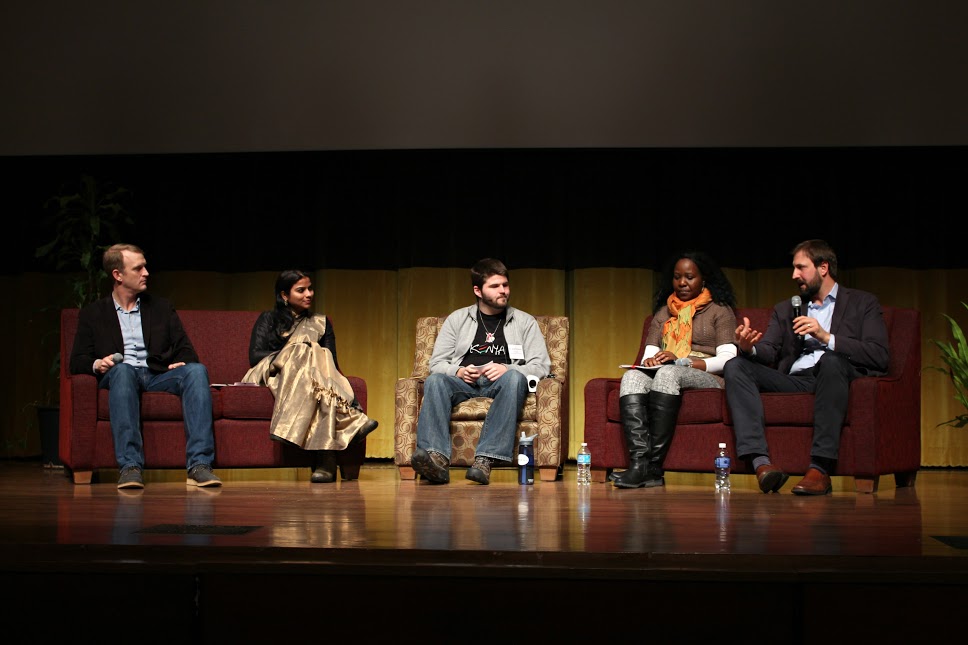Last weekend, 300 students and faculty gathered from across the country for Calvin’s 11th annual Faith and International Development Conference (FIDC). The conference brought together participants from 15 different colleges to learn more about social justice, poverty and what it means to serve globally.
In 2006, students Jackie Bilts (now Bouvette) and David Beversluis created FIDC out of their desire to not just study development from an academic perspective, but to learn from the people who were doing the hands-on work in the field.
“The purpose of the conference was to educate, inspire and equip students to love and serve others,” said JD Croft, co-director of FIDC. “FIDC is about showing us how we can use the gifts God gave us to be actively involved as agents of Christ’s love in the global community.”
Croft and his co-director Comfort Sampong began preparing for FIDC back in May. Over the course of 10 months, they and their team of student volunteers coordinated the speakers, organizations and colleges that participated in the conference. FIDC is unique in that it is a student-led conference. This year, Croft and Sampong chose the theme “Agape: Awakening Sacrificial Love in the Everyday.”
“This phrase encompasses the hopes and challenges that come with embodying Christ’s love in the places we are and with the people we meet,” Sampong described in her opening words at the conference. “It is a love that is not limited to sentimental acts of kindness but is insistent on restoring justice and seeing those across oceans, railroad tracks and streets as brothers and sisters.”
The conference featured speakers from prominent global development organizations, including Faustine Wabwire, senior foreign assistance policy analyst for Bread for the World; Peter Greer, president and CEO of HOPE International; Anu George Canjanathoppil, director of national strategy and interventions for International Justice Mission in Delhi, India; and Calvin alumnus Jeremy Konyndyk, director of USAID’s Office of U.S. Foreign Disaster Assistance.
Speaking on what it means to love sacrificially, the speakers shared many of the joys and struggles that come along with working internationally in areas of poverty and injustice. They offered students practical advice as they begin their careers in development and shared how their passion to love people around the world starts here at home.
The advice given from these development experts served as a useful tool for students entering global development work. Senior Ellie Hutchison said, “I think it’s really important to hear the wisdom and insight gained from years of experience working in development that our speakers have to share. The more realistic we are going into this field, the more effective and sustainable we and our work will be.”
In addition to hearing from the speakers, over 30 non-profit organizations took part in the conference. Students were given the opportunity to learn from these organizations by participating in workshops in areas like immigration, climate change, child sponsorship, criminal justice reform, short-term missions and world hunger.
For many at FIDC, though, the most memorable part of the conference was “SEVEN,” a documentary-style play directed by senior Emily Wetzel. The play told the story of seven women who fought injustice in their lives in Guatemala, Northern Ireland, Afghanistan, Cambodia, Russia, Pakistan and Nigeria. As the play shared real life stories of fighting domestic abuse, standing up for women’s education, representing the poor and creating peace and equality, the powerful stories of these women stood as a reminder to all about the importance of creating justice for all people.
Junior Cameron Kritikos reflected on how meaningful the play was for him: “I am grateful to have Calvin become a common place in which harsh realities such as the abuse of women’s rights are spoken about boldly and prophetically.”
Each year, FIDC provides students the chance to learn more about problems of poverty and injustice in our world. More than that, though, the conference helps students find their place in serving the global community.
“There is something about bringing a bunch of passionate, committed people together for the sole purpose of sharing ideas that is really exciting,” said junior Maaike Mudde. “Conferences are a great chance to network — and especially for international development students. It helps us gain an understanding of what it looks like to be in the field, not just a student of the field.”








